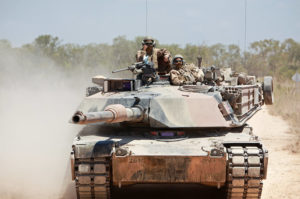
U.S. Marines with Alpha Company, 1st Tank Battalion, 1st Marine Division ride in an M1A1 Abrams tank to their objective during exercise Gold Eagle 2013 at the Mount Bundey Training Area, Northern Territory, Australia, Sept. 14, 2013. (DoD photo by Sgt. Sarah Fiocco, U.S. Marine Corps/Released)
Fred Reed, writing at the Unz Review, explains that, as militaries sit unused, they deteriorate, and that commanders who join in peacetime are rarely prepared to contemplate a major war breaking out in their tenure. Perhaps most insightfully, Reed notes that wars rarely turn out at their end as they were expected to at their beginning.
Most ominously, Reed warns that America’s military is so focused on funding new weapons systems, that there are few spare parts or munitions to be had if a real war did break out. And, Reed theorizes that America cannot fight a large land war because conscription would be required, and “The public would not stand for it.” He writes (abridged):
For a couple of decades, I covered the military for various publications, as for example the Washington Times and Harper’s, and wrote a military column for Universal Press Syndicate.
The military beat was a great gig, letting you fly in fighter planes and sink in submarines. But if you take the study seriously, as I did, you learn interesting things. Such as that a war with a real country, such as Russia, China, or even Iran, would be a fool’s adventure. A few points:
The US fleet has not been in a war since 1945, the air forces since 1975. nor the Army in a hard fight since Vietnam. Bombing defenseless peasants, the chief function of the American military, is not war.
In extended periods of peace, which includes the bombing of peasants, a military tends to assume that no major war will come during the careers of those now in uniform. Commanders consequently do what makes their lives easy, what they must do to get through the day and have reasonable fitness reports.
This does not include pointing out inadequacies of training or equipment. Nor does it include recommending large expenditures to remedy deficiencies. Nor does it include recommending very expensive mobilization exercises that would divert money from new weapons.
The United States cannot fight a large land war, as for example against Russia, China, or Iran. Such a war would require conscription. The public would not stand for it. America no longer enjoys the sort of patriotic unity that it did at the beginning of the war against Vietnam. It will not accept heavy casualties.
People today are far more willing to disobey the federal government.
Being in a real war is hard on equipment. There are battle damage and heavy wear and tear. This doesn’t matter in the wars today’s military fights. America cannot really lose, only be worn down and leave. If the US “loses” in Afghanistan or Syria, it won’t matter to Americans and few will even notice. Because America always fights from well-protected bases and airfields, it can afford to use weapons that require a lot of maintenance, often including high-tech work. In a real war, no.
How Wars Turn Out
Typically, not as planned. I’ve said this before, but it is worth repeating. Look at history:
The American Civil War was supposed to last a day at First Manassas; wrong by four years and 650,000 dead. Napoleon thought his attack on Russia would end with the French in Moscow, not the Russians in Paris–which is what happened. WWI was supposed to last weeks and be a war of movement; wrong by four bloody years of trench warfare. The Japanese Army did not expect WWII to end with GIs buying their daughters drinks in Tokyo, nor the Germans that it would end with the Russian infantry in Berlin. The Americans did not think they would lose in Vietnam, nor the Russians that they would lose in Afghanistan. And so on.
Read more here.
If you’re willing to fight for Main Street America, click here to sign up for my free weekly email.




